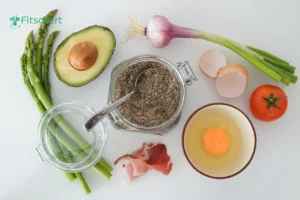Worried About Your Immunity? Stop Eating These Food Ingredients Now!
Did you know that certain food ingredients can harm your body’s ability to defend against viruses, bacteria, and other harmful invaders?
Your immune system, which is like a team of superheroes in your body, works non-stop to keep you healthy and fight off illnesses.
One key factor that affects how well your immune system works is the food you eat.
The things we put into our bodies can either make our immune system stronger and better at protecting us or weaken it, making it easier for us to get sick.
Top 5 Food Ingredients That Can Harm Your Immune System
Understanding what goes into our meals is crucial for maintaining a healthy immune system. Here are the top 5 foods that can negatively impact your immune function:
Refined Sugars
Refined sugars are processed sugars that have lost their natural nutrients and minerals.
You can find them in products like soda, candy, and pastries, as well as many processed foods to enhance flavor and extend shelf life.
Examples of refined sugars include:
- White sugar
- Brown sugar
- Corn syrup
- High-fructose corn syrup
Impact of Refined Sugars on Your Immune System
Consuming high amounts of sugar can lead to inflammation, making your body more vulnerable to infections.
Moreover, excessive sugar intake can hamper the functioning of white blood cells, which are crucial for fighting off pathogens.
It’s worth noting that refined sugars contribute to issues like weight gain, obesity, and type 2 diabetes, all of which can weaken your immune system.
Better Choices
To minimize the negative effects of refined sugars on your immune system, consider healthier alternatives like natural sweeteners.
Options such as raw honey, maple syrup, and stevia provide sweetness without the harmful impact of refined sugars.
Trans Fats
Trans fats are formed through a chemical process known as hydrogenation.
In this process, hydrogen is added to liquid vegetable oils, transforming them into solid fats when at room temperature.
These fats are commonly present in various processed foods such as margarine, packaged snacks, baked goods, and fried foods. They are utilized to prolong shelf life and enhance flavor.
Impact of Trans Fats on Your Immune System
Trans fats can negatively affect your immune system in several ways.
They contribute to increased inflammation in the body, making it more challenging for your immune system to effectively respond to threats.
Moreover, trans fats play a role in the accumulation of plaque in the arteries, which can lead to heart disease—a condition that weakens the immune system.
Better Choices
Opt for healthier fats in your diet by incorporating sources like salmon, nuts, nut butter, seeds, avocados, and coconut oil, and replace trans fats with these alternatives.
Artificial Sweeteners
Artificial sweeteners are man-made substitutes for sugar used to add sweetness to foods and drinks without the extra calories found in natural sugars.
These sweeteners are commonly present in diet sodas, sugar-free gum, and various low-calorie or “light” products.
Examples of artificial sweeteners include:
- Aspartame
- Sucralose
- Saccharin
Impact of Artificial Sweeteners on Your Immune System
Despite being marketed as a healthier option to sugar, artificial sweeteners can have adverse effects on your immune system.
Studies suggest that they may disrupt the balance of gut bacteria, crucial for a healthy immune system.
Moreover, some research indicates that artificial sweeteners might increase inflammation and potentially lead to insulin resistance, both of which can compromise your immune response.
Better Choices
To reduce the impact of artificial sweeteners on your immune system, consider using natural alternatives like stevia, raw honey, and maple syrup.
Processed Meats
Processed meats undergo various alterations such as smoking, curing, salting, or the addition of chemical preservatives.
Examples of processed meats include:
- Hot dogs
- Sausages
- Bacon
- Deli meats
- Canned meats
These products often contain high levels of sodium, fat, and additives, which can have negative health consequences.
Impact of Processed Meats on Your Immune System
The high sodium content in processed meats may lead to inflammation and elevated blood pressure, potentially compromising your immune response.
Additionally, many processed meats contain nitrates and nitrites, linked to increased inflammation and a higher risk of certain cancers.
Moreover, the saturated fat in some processed meats can contribute to obesity and related health issues that weaken the immune system.
Better Choices
Opt for unprocessed meats like chicken, turkey, or lean cuts of beef and pork. Trim visible fat and use cooking methods such as grilling or baking to minimize added fats.
Pesticide Residues
Pesticides are substances used in agriculture to protect plants from pests, diseases, and weeds, ensuring higher crop yields and better-quality produce.
However, residues from these pesticides can linger on fruits, vegetables, and grains even after washing and cooking.
Impact of Pesticide Residues on Your Immune System
Although pesticides are designed for pests, their residues on our food may affect the human immune system.
Some studies suggest a link between pesticide exposure and disruptions in immune function, including altered white blood cell function and increased inflammation.
Prolonged exposure to certain pesticides may also heighten the risk of specific cancers and other health problems, further compromising the immune system.
Better Choices
When possible, choose organic produce grown without synthetic pesticides. While organic foods may still have some natural pesticide residues, they are generally considered less harmful.


















